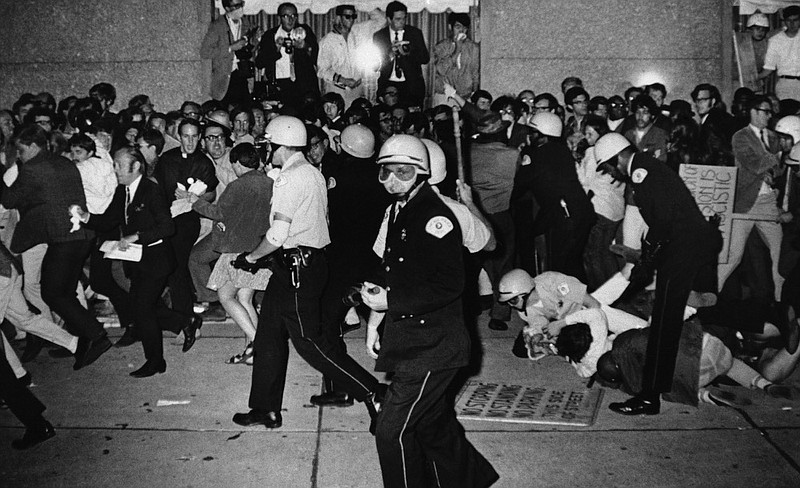Fifty years ago late last month, the Democratic Party found itself in a nightmare largely of its own making.
The Vietnam War, widened greatly by then-Democratic President Lyndon Johnson, had become an unwinnable morass in a country whose strategic interest to the U.S. seemed less and less clear. His party had splintered into end-the-war and maintain-the-war factions, which were then shattered by a mid-summer assassination and subsequent riots.
Thus, the 1968 Democratic National Convention in volatile Chicago, run by dictator-like Democratic Mayor Richard J. Daley, was rife to explode. And explode it did, with 10,000 protesters ultimately clashing with 23,000 police and National Guardsmen. After four days and nights of violence, 668 people were arrested, 192 police officers were injured and 425 demonstrators were treated at temporary medical facilities.
Just over two months later, Republican Richard Nixon was elected president. Many voters, it has been suggested, made their choice on Nov. 5 based on what they saw during those four days in Chicago.
In 2018, with the approach of mid-term elections, the Democratic Party is in another nightmare unquestionably of its making.
It has put all its energy, much of its money, most of its time and has eschewed all other issues in an attempt to unseat or discredit the duly elected president of the United States, Donald Trump.
As in 1968, the party has splintered into factions, one far left of center and one farther left of center. The faction at the farthest left openly supports socialism, something even the most left-leaning in the party 50 years ago would find unacceptable, untenable and un-American. Most Democrats at the time were a lot of things, but they weren't socialists.
Today's Democrats want you to believe the president, the White House and the Republicans are in turmoil, but they're a virtual united front compared to their opposition.
Earlier this week, for instance, more than a dozen leading liberal groups sent a letter to Democratic Senate Minority Leader Chuck Schumer, accusing him of failing the party. His job, the letter maintained, "is to lead your caucus in complete opposition to Trump's attempted Supreme Court takeover."
We're not sure what the groups don't get about complete opposition, but the minority leader has been as vile and hateful as the rest of Democrats in opposing the Supreme Court nomination of the eminently qualified Brett Kavanaugh. He and his party have received a paper trail on the nominee longer than the last five confirmed nominees combined, and he has whined, wheedled and whimpered to anyone who would listen to postpone the hearings until after the election.
The public also was treated to interruptions and chants at the hearing on the nominee by left-wing demonstrators and stalling and delaying tactics by Senate Judiciary Committee Democrats. The atmosphere was so charged and so potentially violent the nominee had his daughters leave the room.
Middle America, as it did when it watched the 1968 Democratic convention, may have seen all it needed to.
But the letter from the left-wing organizations also accused Schumer of sacrificing "the Supreme Court in order to hold Democratic Senate seats."
It's true some Democrats, including some running for re-election in November in states Trump won in 2016, didn't announce their opposition to Kavanaugh before the hearings - because about half of Democrat senators did.
But Schumer would like to keep some of those Democrat seats because losing them makes a majority even more difficult to achieve in 2020 or thereafter. Poor Chuck, then. He's darned if he does and darned if he doesn't.
And then there's the party's division. Just this week in far-left Massachusetts, a far-left congressional candidate, Ayanna Pressley, upset a 10-term Democrat who was in good standing with all the "correct" Democratic groups and policy positions. Her seat, which she is virtually assured of winning since there is no Republican opposition, is the one once held by John F. Kennedy and Tip O'Neill. Kennedy and O'Neill were Democrats, but they would have fought anyone who suggested they might have socialist leanings.
Similar candidates have won nominations in a New York congressional race and the Florida gubernatorial primary, among others.
Those candidates advocate policies like Medicare for All, a $15-an-hour minimum wage, tuition-free college and the elimination of Immigration and Customs Enforcement, all of which traditional left-wing Democrats want but know they have no way of passing in either the House or the Senate (even if they were to win both).
Oh, and remember Chicago, site of the 1968 convention and the unrest? Fifty years later, it's still full of unrest. Through last Sunday, it had 473 gun violence deaths over the past 12 months, 365 homicides this year, and blacks were victims in 403 of the deaths in the past year. In the past 50 years, Chicago has had only Democratic mayors, and its current mayor, former Clinton and Obama administration official Rahm Emanuel, recently threw in the towel in consideration of a third term. He's had enough.
In many ways, Democrats seem to have gone back to the future.
